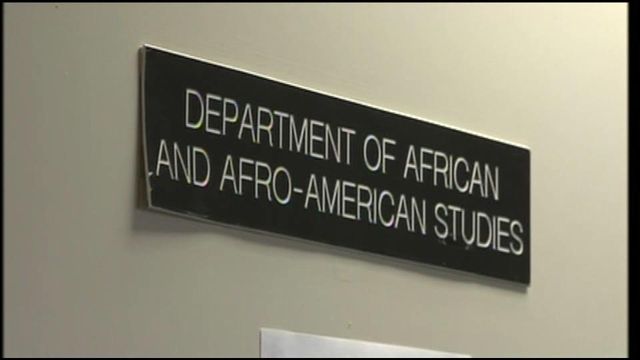UNC System looking at UNC-CH internal academic investigation
UNC System leaders want to know exactly what steps UNC-Chapel Hill took to detect problems in a department accused of providing preferential treatment to athletes and what they are doing to fix those problems.
Posted — UpdatedUNC System leaders want to know exactly what steps UNC-Chapel Hill took to detect problems in the department accused of providing preferential treatment to athletes and what they are doing to fix those problems.
An internal review at UNC found problems with 54 classes in the African and Afro-American Studies Department going back to the 2006-07 school year. Members of the Tar Heels’ football and basketball teams made up nearly 40 percent of the enrollees in those classes; nearly another 20 percent were student-athletes in other sports..
At the center of the controversy is retired African and Afro-American Studies Department Chairman, Julius Nyang’Oro, who is the listed professor for 30 of those classes. The most recent of the courses was taught in the second summer session of 2011, when the NCAA was wrapping up an investigation into the football program on multiple violations including academic fraud. That specific course, AFAM 280, is on record of having 18 of the 19 students as football players.
UNC System President Tom Ross appointed a panel of five from Board of Governors to look into an internal UNC-CH investigation to determine if leaders did enough to detect academic problems and correct them. Friday marked their first meeting.
"Throughout this ordeal, we have asked hard questions, and we have found answers that are humiliating and painful," said UNC Chancellor Holden Thorp.
UNC leaders say in some cases students turned in work with no supervision. In other situations, instructors’ names may have been forged on documents and grades changed.
"Our system did not anticipate a situation where both the chair and the manager could have been involved in the irregularities," said Jonathan Hartlyn, UNC Senior Associate Dean for Social Sciences and Global Programs.
UNC leaders stressed that parts of this situation couldn't happen again with a computer system for course enrollment that replaced a paper-based one. But, many questions remain about just what was going on.
WRAL found in a recent review that some of the classes in question listed a maximum capacity of just one student -- which could have discouraged some from trying to register for the class. A summer session class taught in 2007-08 by Nyang’Oro listed the max enrollment at just one but saw 22 active enrollees – 12 of them student-athletes.
"It's a very legitimate tool to be used and it's possible that it could have been used to restrict who got into those classes, but we don't know what those criteria were," said Chris Derickson, UNC registrar.
While many of the classes in question are listed as 400- and 500-level courses, Derickson said that in some cases, a course doesn’t necessarily require a pre-requisite. There are times when an entry-level course could be labeled 400-level, he said. It is unclear if that was the case in the Afro and Afro-American Studies Department.
UNC leaders said several times on Friday that the motivation of the Nyang’Oro and Crowder may never be known. Both have refused to speak about the matter.
The chair of the UNC System’s five-person appointed panel, Louis Bissette, said that their work is still in its early stages, but nothing seems amiss so far.
“I guess off the top of my head, I would say I believe they’ve made a good faith effort at this and we’ve got a long way to go,” Bissette said. “I hope in October I’ll be able to give you a more complete answer to that.”
• Credits
Copyright 2024 by Capitol Broadcasting Company. All rights reserved. This material may not be published, broadcast, rewritten or redistributed.






